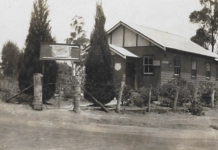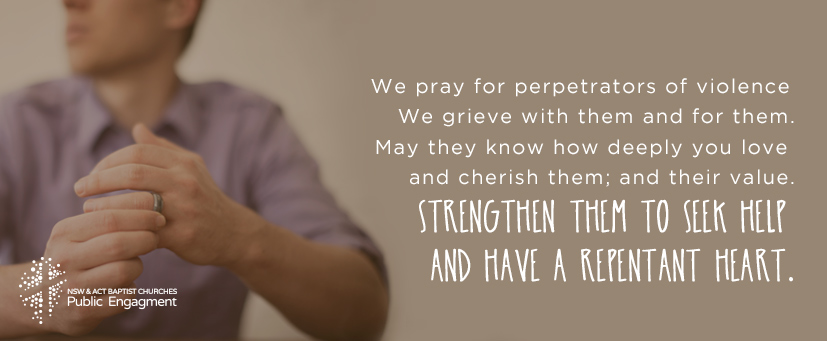
During the month of November, particularly on the 25th November, the International Day for the Elimination of Violence Against Women and the Days of Action that follow, domestic and family violence will be under the spotlight of community attention. Baptist churches have an opportunity to add their voice to the call for deep change, with the humble recognition that this entrenched problem is found both within the church and beyond the church.
The problem of violence within families and the trauma that it produces cannot be left behind closed doors. Too much is at stake. Christians are called to build healthy relationships, to pursue peace and wholeness and to use power to serve rather than to control others. This call rings loudly within the intimacy of marriage and family relationships. Domestic and family violence tears apart the fabric of marriages, destroys trust, diminishes women and overwhelms children.
The first task for the church is to recognise the problem of domestic and family violence. It is termed ‘domestic’ violence not because it is excusable and less significant. We are not dealing with ‘domesticated’ violence. This violence is different to the common disagreements and conflicts that arise in any relationship and can be resolved peaceably. Instead a destructive pattern of power, control and coercion develops and the perpetrator of the violence is more commonly male.
Often the violence takes the form of physical violence but it is not limited to this expression. Perpetrators can use many other forms of violence, such as emotional, spiritual and financial abuse. Choice is taken away from the victim and their world shrinks, with levels of support removed. The focus for the violence is placed on the victim by the perpetrator: “Why did you make me do that?” The common question asked in churches and the community – “Why doesn’t she just leave?” – reinforces this focus on the victim being responsible for the problem. A more helpful question, that brings the perpetrator back into focus, promotes accountability for the use of violence and the opportunity for change is this: “Why doesn’t he stop?”
In addition to recognising the problem, in terms of prevalence (this is a national crisis) and form (includes physical abuse but not limited to this expression), Baptist churches need to be equipped to respond appropriately. Responses that deny the existence of the problem, diminish its impact or shift blame from the perpetrator to the victim add to the trauma rather than address it.
The cross of Christ offers costly grace that speaks to uncomfortable truths, holds individuals to account and takes seriously the potential of human beings to harm those they claim to love the most. In the resurrection of Jesus we find real hope for transformation. Men who use violence and control can choose a new way. The Spirit of God brings about deep change, from the inside out, transforming beliefs, values, attitudes and behaviours.
Anger management workshops are not the answer. Issues related to gender, use of power, entitlement and honest communication need to be faced and these sit deep beneath the waterline of observable behaviours. Followers of Jesus believe in the gospel of sin transformation, not sin management. This is hard work and time is needed to work through the changes. The church has an opportunity to hold men to account and to assist them in this process of transformation, so they can be the partner and parent they aspire to be.
In responding to the problem of domestic and family violence, an answer needs to be given to the question “What about the men?” It is true that some men are victims of domestic violence and there needs to be a compassionate response to them and appropriate help for women who perpetrate violence. The data tells us that our nation has a problem overall with male violence. Men face the greatest risk of violence at the hands of other men in a public place. For women, the riskiest place is in their home, at the hands of their partner/former partner and this risk escalates at the point when they leave home. We need to respond to the problem of violence against women and assist men to change. Christian men can model and call for those attitudes and behaviours toward women that hold to respect and the use of power to serve rather than control. The focus of the White Ribbon Australia campaign, for men to “stand up, speak out and act to end violence against women” is a commitment that is aligned with the values of God’s kingdom.
Helpful responses to this issue involve an awareness of how to refer people impacted by domestic and family violence, particularly women and children, to expert help and support. We don’t need to become experts in this area. Domestic and family violence is a deep and complex problem but there is much that we can do. There are opportunities for churches to provide financial resources to support specialist services, including crisis accommodation. Practical help can be given to address the financial burden faced by women as they rebuild their lives. There are a number of Helplines that can be accessed for specialist assistance and the booklet developed by the Public Engagement Group provides details of these. The booklet can be downloaded from the Baptist Association website at https://nswactbaptists.org.au/public-engagement/domestic-violence/
Consider how you can become more informed and equipped to assist others and live out God’s pattern for healthy relationships. Churches have a key role in changing the Australian story of domestic and family violence.
Rob Ellis, Member of Public Engagement Group (Baptist Association), General Manager of Community Services (BaptistCare)




































